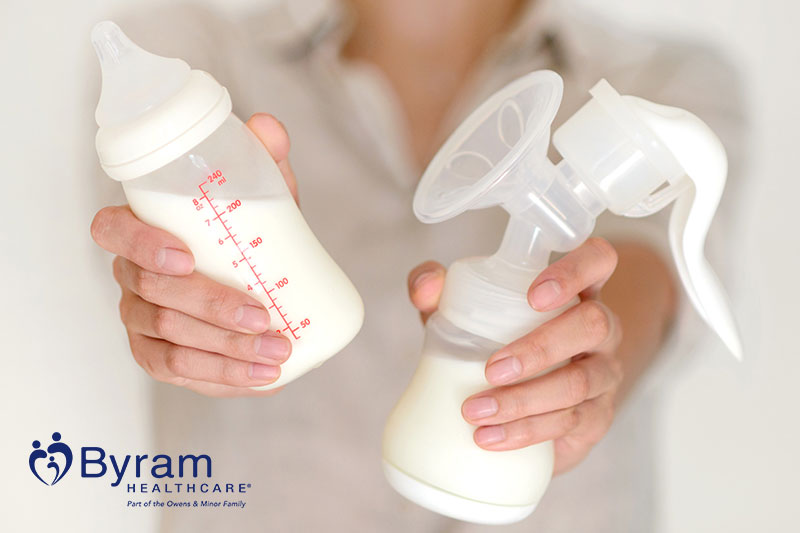Understanding Your Milk Supply
Breastfeeding is a great time for moms and newborns to bond. Your breast milk carries thousands of antibodies and benefits the development of your baby from day to day. While many women struggle with breastfeeding at first, persistency will inevitably lead to success. If you’re having problems breastfeeding or are getting frustrated, talk to your doctor about how a latching consultant can help. A latching consultant is a great way to hasten the process and provide you with the support you need to continue breastfeeding.
In the mean time, one thing that will help is learning about how the process works. When you know what your body’s capable of doing, you’ll be more likely to stick to the process. The first step involves understanding your milk supply.
During Pregnancy
Your body is on a journey to prepare for welcoming your new baby into the world. During pregnancy, your hormones will fluctuate and give your body a signal that it’s time to prepare. Before you and your baby develop a rhythmic schedule, your milk supply is largely in the hands of your hormones. Halfway through your pregnancy, your body will start making colostrum.
Thanks to progesterone levels, you won’t start secreting milk until delivery when your hormones dramatically reduce in levels.
Immediately After Delivery
After you give birth and the placenta has been delivered, your hormone levels will drop dramatically. This is a cue for your body to start making the necessary changes to switch from colostrum to milk production. Your body is ready to start nursing almost immediately after delivery and doing so is important in “activating” your milk producing cells.
The First Few Days
About 30-70 hours after delivery, your milk production switches to something scientifically known as Lactogenesis II. In layman’s terms, this is when your body starts kicking into high gear and producing larger amounts of milk. Pregnancy hormones are replaced with prolactin, insulin, and hydrocortisone—all of which contribute to milk production.
Your hormones and body know that it’s time to start feeding your newborn, so all of this occurs naturally. Since this is still a hormonal driven occurrence, it will occur whether or not you decide to breastfeed. After a few days, your baby will have gotten all of your colostrum and it is replaced with breast milk.
The First Month
During this time, your body will get used to your baby’s breast milk needs. Prolactin plays a large part in the regulation of your milk supply and fluctuates every time milk is removed from your breasts. To continue to produce enough milk, you should establish a strong breastfeeding schedule. This symbiotic relationship works in supply and demand parameters, so always make sure that you’re feeding your baby enough milk at each feeding.
Responsive feeding will help ensure that your body continues to make enough breast milk for your baby’s needs. Don’t worry if you feel like you’re feeding them too often—newborns eat a lot! We’ll cover a few ways to tell if your baby is getting enough milk later.
Beyond Six Weeks
After the initial month or so, your body has become an efficient, milk-producing machine. Your prolactin will start to decline as your breasts essentially take over control and go into autopilot mode. If you’ve successfully made it this far without any problems, your body will work strictly on a supply and demand basis. If you notice any changes beyond six weeks that worry you, give your doctor a call.
Things That Can Reduce Breast Milk Supply
If you’re baby isn’t getting the milk they need, one of the biggest indicators will be a lack of weight gain. While there are things to do to increase low milk supply, you should first look at what’s causing a reduction in production.
Infrequent Nursing
Your milk production works as a supply and demand system, so if you’re not breastfeeding frequently enough, your body gets a signal that it doesn’t need to produce more milk. The more infrequently you nurse, the lower your breast milk supply will be.
Short Feedings
If you are rushing through nursing, you need to slow down. Shorter feedings not only lower the nutrients your baby is getting, but they don’t allow your breasts to completely drain—a vital aspect in producing milk.4 Short feedings are bad for both baby and mom, so allow your baby to feed until completion.
Increased Stress
When you’re stressed, your body releases cortisol. At times, cortisol has been shown to interfere with the production of breastmilk. Increased stress in general isn’t good for your long-term health, but it will also affect your overall milk supply.
Bad Latching
Latching is one of the more difficult aspects of breastfeeding. If you’re new at this, it’s hard to tell whether or not things are working correctly. However, getting a correct latching position is extremely important. Not only will it help you stay comfortable and relieve discomfort, it will stimulate milk production.
Timing
Throughout the day, your breast milk supply will fluctuate. It’s completely normal and nothing to be worried about. Most moms experience the highest milk supply during early morning, so if you start to notice a decline throughout the day then consider pumping more in the morning when you’re at your most efficient production time.

Pacifiers
Some babies get attached to their pacifiers then don’t want to suckle when it’s time to breastfeed. Less suckling during feeding times leads to lower milk production. If you’re noticing this, consider opting for nursing sessions instead of giving your baby a pacifier right away.
Supplementing
You should avoid mixing formula into your baby’s feeding schedule if you want to continue to produce enough milk. When you supplement feedings with formula, your baby will end up needing less milk from your breasts, which leads to less milk production. If you want to bottle feed, use a breast pump instead of formula.
How to Stimulate Breast Milk
If you’re struggling to produce enough milk, try doing a few of the things from this list to help stimulate your breast milk.
Nurse More Often
To make sure you’re not lowering your milk production, nurse more often. Opt for responsive feeding so you develop a more consistent and regulated production. If you know you’re going to be apart from your baby for a long period of time, use a breast pump to ensure that your milk supply stays strong.
Use Both Breasts
To help stimulate milk production the most efficiently, make it a habit to empty both breasts. This will help your milk production stay high throughout the day.
Practice Self-Care
To avoid problems with milk supply due to stress, practice self-care. If you feel tired or need a break, talk to your partner about getting some down time. Mommy time is hard to come by in those first few months, but is essential if you want to continue to give your newborn the best care possible.
Ensure a Proper Latch
To make sure your baby is latching correctly, try switching positions. If all else fails, we recommend finding a latching consultant to help you and your baby get the most out of your nursing sessions. Talk to your doctor to get recommendations in your area.
Incorporate Pumping
If you can’t nurse at every feeding, incorporate pumping. Pumping will still empty your breasts well enough to stimulate milk production. Plus, your baby will still reap the benefits of breast milk when you pump. Just make sure you’re taking the proper steps to safely store and wash your pumping materials.
How to Tell if Your Baby is Getting Enough Milk
If you’re breastfeeding regularly and your baby seems content, chances are they’re getting enough milk. If you’re worried, here are a few telltale signs that your baby is getting what they need.
- Your baby’s gaining weight regularly—4-7 ounces per week is a good sign.
- Your baby seems happy and content after feeding.
- Your baby’s peeing regularly, at least 6 times a day, and has light yellow or colorless urine.
- Your baby’s diapers have mustard-colored poops every day.
If you’re still worried about whether or not your baby is getting enough milk, talk to your doctor during their regular checkup.
Conclusion
Breastfeeding is a wonderful time, but often comes with a few troubleshooting issues. Once you work through the challenges, your body will be able to consistently supply your baby with what they need. To help make your breastfeeding efforts easier, or if you’re struggling and feel like giving up, talk to your doctor about finding a latching consultant or breastfeeding specialists. Additionally, thanks to the Affordable Care Act, new and expecting mothers are eligible to receive a breast pump covered by their insurance provider. Browse our wide selection of manual and electric pumps.
If you have any tips or advice about breastfeeding or pumping, head over to our Facebook page today and leave a comment!






